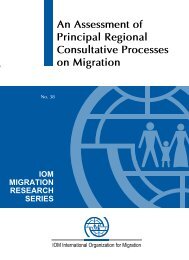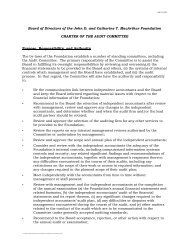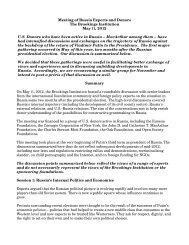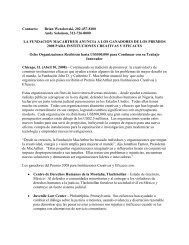A Global Compact on Learning - Brookings Institution
A Global Compact on Learning - Brookings Institution
A Global Compact on Learning - Brookings Institution
You also want an ePaper? Increase the reach of your titles
YUMPU automatically turns print PDFs into web optimized ePapers that Google loves.
6<br />
C<strong>on</strong>clusi<strong>on</strong>s and Policy<br />
RECOMMENDATIONS<br />
The educati<strong>on</strong> community has dem<strong>on</strong>strated its capacity<br />
for powerful and collective acti<strong>on</strong> during the<br />
past decade as more girls and boys enroll in primary<br />
school than ever before in history. However, there<br />
is an unfinished agenda: Progress has been highly<br />
uneven, with poor girls and c<strong>on</strong>flict-affected young<br />
people especially left behind; recent data show that<br />
even for those in school, milli<strong>on</strong>s are failing to master<br />
the most basic skills, including those at the postprimary<br />
level. It is time for an expanded educati<strong>on</strong><br />
agenda that centers <strong>on</strong> the goal of learning for all as<br />
the new minimum threshold to which the educati<strong>on</strong><br />
community must aspire.<br />
A new <str<strong>on</strong>g>Global</str<strong>on</strong>g> <str<strong>on</strong>g>Compact</str<strong>on</strong>g> <strong>on</strong> <strong>Learning</strong> is needed to<br />
catalyze and sustain collaborative acti<strong>on</strong> to achieve<br />
quality educati<strong>on</strong> for all, building <strong>on</strong> the success of<br />
the past and fulfilling the promise of educati<strong>on</strong> that<br />
parents around the world have now come to expect<br />
for their children. Even the poorest children have a<br />
right to access learning opportunities and reap the<br />
benefits of a quality educati<strong>on</strong>.<br />
A diverse array of vibrant networks is required to<br />
realize this visi<strong>on</strong>, including those in educati<strong>on</strong>,<br />
health, technology, agriculture, climate change,<br />
and ec<strong>on</strong>omic development. The broad framework<br />
of the <str<strong>on</strong>g>Global</str<strong>on</strong>g> <str<strong>on</strong>g>Compact</str<strong>on</strong>g> <strong>on</strong> <strong>Learning</strong> is needed to<br />
harness the commitment, energy, and innovati<strong>on</strong><br />
of multiple actors to ensure that while each actor<br />
focuses <strong>on</strong> a piece of the learning for all agenda<br />
they complement and leverage each other’s efforts<br />
in pursuit of a comm<strong>on</strong> goal. To move this <str<strong>on</strong>g>Global</str<strong>on</strong>g><br />
<str<strong>on</strong>g>Compact</str<strong>on</strong>g> from aspirati<strong>on</strong> to acti<strong>on</strong>, all actors must<br />
work together to embrace six principles needed<br />
for change:<br />
• Leadership: Leadership <strong>on</strong> educati<strong>on</strong> is<br />
needed at the highest political levels. From<br />
leaders of developing and developed countries<br />
to heads of foundati<strong>on</strong>s, corporati<strong>on</strong>s<br />
and n<strong>on</strong>governmental organizati<strong>on</strong>s<br />
(NGOs), <strong>on</strong>e message must be c<strong>on</strong>sistent<br />
and clear: that learning matters and that it<br />
matters for all children and youth, even the<br />
hardest to reach.<br />
• Partnership: The <strong>on</strong>ly way to achieve learning<br />
for all is to work together. The multiple<br />
networks of actors committed to improving<br />
learning in the developing world must leverage<br />
each other’s efforts both to maximize<br />
their impact and to ensure they are all pulling<br />
in the same directi<strong>on</strong>.<br />
• Financing: More resources must be committed<br />
to achieve the agenda of learning for<br />
all while, at the same time, resources should<br />
be used more efficiently.<br />
• Measurement: Systematically measuring<br />
learning achievement in a way that can<br />
track progress against existing disparities<br />
and provide useful and timely insight for<br />
classroom-level practices is essential to fulfill<br />
these goals.<br />
• Advocacy: Mobilizing public opini<strong>on</strong> and<br />
sending str<strong>on</strong>g signals to governments <strong>on</strong><br />
the importance of learning for all is a crucial<br />
strategy for catalyzing needed leadership<br />
and acti<strong>on</strong> as well as holding policymakers<br />
to account.<br />
• Building evidence: Although data and<br />
emerging evidence exist to identify the most<br />
promising strategies for achieving parts<br />
of the learning for all agenda, remaining<br />
A <str<strong>on</strong>g>Global</str<strong>on</strong>g> Compa c t <strong>on</strong> <strong>Learning</strong>: Taking Acti<strong>on</strong> <strong>on</strong> Educat i o n in Developing Countries<br />
C e n t e r for Universal Educat i o n at <strong>Brookings</strong><br />
48






